Prograf 1 mg
Immunosuppressant medication Prograf 1 mg is used to treat moderate to severe atopic dermatitis (eczema) and prevent organ rejection after a transplant. Eczema, also known as atopic dermatitis, is a common skin condition marked by red, itchy patches of skin. Among the symptoms include itchy, dry, flaky, swollen, rough, and irritated skin. Organ rejection occurs when a patient’s immune system recognizes a donated organ as alien and strives to destroy it.
Tacrolimus, which is contained in Prograf 1 mg, prevents immune cells in the skin from overreacting to stimuli. Thus, allergic responses and inflammation are diminished (redness and swelling). Prograf 1 mg suppresses T and B lymphocytes (immune system cells) that generally attack foreign intruders and guard the body against foreign cells and infection. Consequently, organ rejection in transplant patients is minimized, and the body is better prepared to accept the new organ.
Follow your physician’s instructions when taking 1 mg of Prograf. Utilize Prograf 1 mg for as long as your doctor prescribes based on your medical situation. Itching, burning sensations, redness, pain, skin tingling, nausea, diarrhea, headache, high blood sugar, kidney problems, disorientation, or stomach pain are all potential adverse effects. The majority of negative effects associated with Prograf 1 mg do not require medical attention and diminish with time. Please consult your physician if the adverse effects persist or worsen.
Inform your physician if you are allergic to Prograf 1 mg or any other drugs. Before taking Prograf 1 mg if you are pregnant or breastfeeding, you should obtain medical counsel. Consuming alcohol while taking Prograf 1 mg may increase the likelihood of serious adverse effects. Prograf 1 mg may create sleepiness, vertigo, or vision problems; therefore, only operate a vehicle if you are attentive. The treated region should not be covered or wrapped with a bandage or dressing. Prograf 1 mg makes the fabric (bedding, clothing, and dressings) in contact with it easily combustible and flammable; avoid smoking and open fires.
Prograf 1 mg is used to treat organ transplantation and atopic dermatitis (eczema).
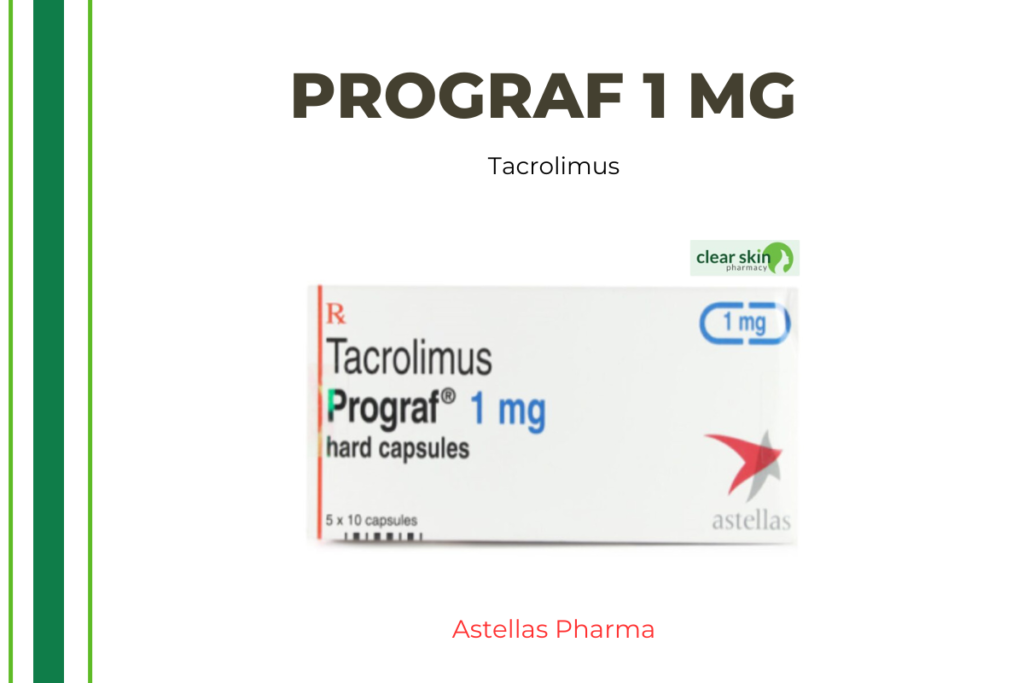
Medicinal Advantages
Prograf 1 mg contains tacrolimus, an immunosuppressant used to treat moderate to severe atopic dermatitis (eczema) and prevent organ rejection after a transplant. Prograf 1 mg stops skin immune cells from overreacting to a stimulus. Thus, allergic responses and inflammation are diminished (redness and swelling). Prograf 1 mg suppresses T and B lymphocytes (immune system cells) that generally attack foreign intruders and guard the body against foreign cells and infection. Consequently, organ rejection in transplant patients is minimized, and the body is better prepared to accept the new organ.
Use Instructions
Hands must be cleansed prior to and after using 1 mg of Prograf. As instructed by your physician, a thin layer of Prograf 1 mg topical can be applied to the affected area of clean, dry skin. Prograf 1 mg is intended for external use only. Avoid getting it in your eyes, nose, or mouth, as it may cause irritation. If Prograf 1 mg accidentally comes into contact with these areas, thoroughly rinse with water. One milligram of Prograf should be administered on an empty stomach or at least one hour before or after a meal. Prograf 1 mg can be taken orally with a full glass of water. It should not be crushed, fractured, or chewed. Just prior to consumption, mix the granules with water. The injection version of Prograf 1 mg is administered as an intravenous (into a vein) infusion by a physician or nurse. Do not medicate yourself.
Place in a cool, dry area out of direct sunlight.
Prograf 1 mg Side Effects
Itching
The sensation of being on fire
Redness
Pain
tingly sensation on the skin
Nausea
Diarrhea
Headache
Blood sugar levels have risen.
Problems with the kidneys
Dizziness
stomach ache
Drug Recommendations
Inform your physician if you are allergic to Tacrolimus or any other drugs. Before taking Tacrolimus if you are pregnant or breastfeeding, you should obtain medical advice. Consuming alcohol while taking Tacrolimus may increase the likelihood of severe adverse effects. Tacrolimus may create drowsiness, vertigo, or vision problems; therefore, only operate a vehicle if you are aware. The treated region should not be covered or wrapped with a bandage or dressing. Because Tacrolimus causes the fabric (bedding, clothing, and dressings) to catch fire and burn easily, avoid smoking and being near naked flames. Avoid getting it in your eyes, nose, or mouth, as it may cause irritation. Tacrolimus can be removed by showering, bathing, or swimming immediately after application. If Tacrolimus accidentally comes into contact with these areas, thoroughly rinse with water. Tacrolimus must not be ingested. Consult a doctor immediately if you unintentionally ingest something.
Interactions Between Drugs
Interactions between drugs: Antifungals (fluconazole, itraconazole, ketoconazole, clotrimazole, voriconazole, erythromycin, clarithromycin, rifampicin), antiemetic (metoclopramide), anticonvulsants (phenytoin, phenobarbital), antacids (lansoprazole, cimetidine, omeprazole), steroid (cortisone (nelfinavir, saquinavir, ritonavir).
Tacrolimus may interact with St. John’s Wort (an herbal antidepressant) and Schisandra sphenanthera extracts. Grapefruit or grapefruit juice should not be used with tacrolimus, as it can cause severe side effects. Also, avoid consuming alcohol while taking Tacrolimus, as it may provoke flushing (causing your face or skin to feel warm and hot) and exacerbate other adverse effects.
If you have skin tumors, a weakened immune system, infected lesions, cutaneous Graft Versus Host Disease (an immune reaction of the skin in patients who have undergone a bone marrow transplant), generalized erythroderma (inflammatory scaling and redness of the entire skin), Netherton’s syndrome, lamellar ichthyosis (extensive scaling of the skin), diarrhea for more than a day, or stomach pain with or without symptoms such as nausea.
Safety Suggestions
ALCOHOL
Consuming alcohol while taking Tacrolimus may increase the likelihood of severe adverse effects. Consult your doctor before drinking alcohol while taking Tacrolimus.
PREGNANCY
Tacrolimus is a pregnancy medication classed as Category C, and it is only administered to a pregnant woman if her physician deems the benefits to outweigh the risks. Before using Tacrolimus while pregnant, consult your physician.
BREAST FEEDING
Because tacrolimus can be secreted in human milk, it is not recommended for nursing mothers because the drug could be harmful to the infant. However, if you are breastfeeding, consult your physician before using Tacrolimus.
DRIVING
Tacrolimus may cause drowsiness, vertigo, or vision problems. Don’t drive if you experience any of these effects after taking Tacrolimus.
LIVER
Consult a physician if you have a history of liver illnesses or difficulties. Your physician can adjust the dosage if necessary.
KIDNEY
If you have a history of renal disease or disorder, you should consult a physician. Your physician can adjust the dosage if necessary.
No habits formed
Advice on Diet and Lifestyle
Quercetin is abundant in apples, cherries, broccoli, spinach, and blueberries (a flavonoid).
Probiotic-rich meals contribute to the development of the immune system’s allergy resistance.
Avoid foods such as dairy, soy, eggs, and nuts if you have an allergy.
High-sugar foods should be avoided, as they might exacerbate inflammation.
Include in your diet fruits, vegetables, whole grains, healthy fats, and seafood.
It would be advantageous to reduce stress and maintain a regular sleep schedule.
Keeping your hands away from strong detergents, soaps, and fabrics.
Recommendations
Consult a dermatologist if the skin condition does not improve after two weeks of treatment with Tacrolimus.
To ensure that you are receiving the correct dose of Tacrolimus, it is suggested that you undergo routine blood, urine, vision, heart function, and neurological tests.
Additional Information: This item cannot be returned.
Concerns of Patients
Eczema, also known as atopic dermatitis, is a common skin condition marked by red, itchy patches of skin. It occurs when an overactive immune system responds aggressively to stimuli. However, it can affect any area of the body. Eczema is a contagious skin disease. Scratching causes irritation and inflammation of the skin, which can result in infections requiring antibiotic treatment. Among the symptoms include itchy, dry, flaky, swollen, rough, and irritated skin.
Organ rejection occurs when a patient’s immune system recognizes a donated organ as alien and strives to eliminate it.
FAQs
Tacrolimus, the immunosuppressant found in Prograf 1 mg, prevents immune cells in the skin from overreacting to a stimulus. Thus, allergic responses and inflammation are diminished (redness and swelling). Tacrolimus also suppresses T and B lymphocytes (immune system cells) from defending the body against foreign cells and infection and attacking external invaders. Consequently, organ rejection in transplant patients is minimized, and the body is better prepared to accept the new organ.
Tacrolimus may cause a transient burning sensation on the skin at the application location as an adverse effect. Consult a physician if the burning sensation persists or worsens.
Tacrolimus is associated with an increased risk of developing skin cancer. Avoid or limit prolonged exposure to the sun or artificial light sources, such as tanning beds. Wear protective equipment and apply sunscreen before venturing outdoors.
It is not advised to take a shower, swim, or bath immediately after applying Tacrolimus since the ointment version of the medication can be removed by water.
Tacrolimus may create changes in color vision, blurred vision, field of view limits, or vision problems. Please inform your doctor immediately if you experience any vision problems while taking Tacrolimus so that the dosage can be changed accordingly. If you are on Tacrolimus, you should have regular eye exams to ensure you are receiving the correct dosage.
Tacrolimus is naturally flammable and can catch fire; therefore, after applying tacrolimus ointment, you should avoid smoking or coming into contact with naked flames.
Tacrolimus should be used for as long as suggested by a physician. Please consult a physician if symptoms continue or worsen after two weeks of treatment with Tacrolimus.

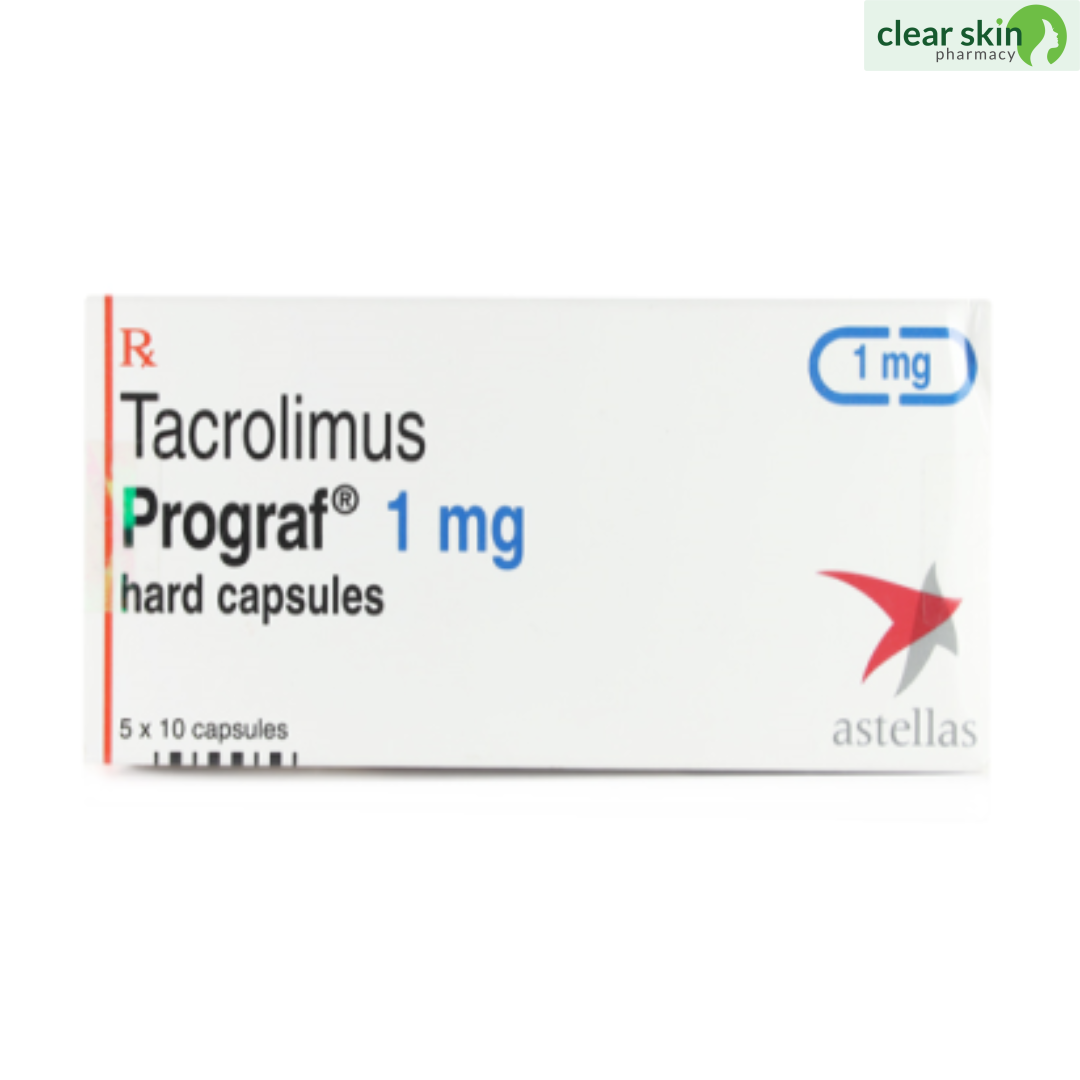
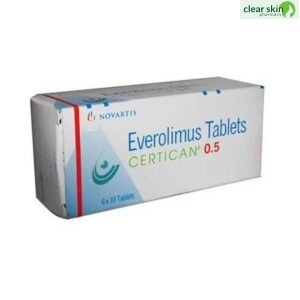
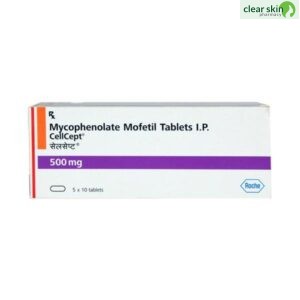
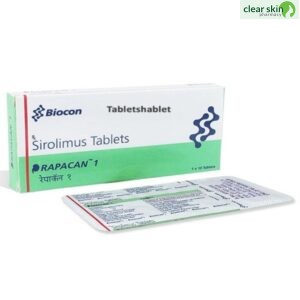
Be the first to review “PROGRAF 1 MG 50 tablets”